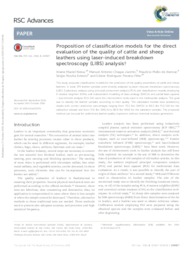Proposition of classification models for the direct evaluation of the quality of cattle and sheep leathers using laser-induced breakdown spectroscopy (LIBS) analysis.
Proposition of classification models for the direct evaluation of the quality of cattle and sheep leathers using laser-induced breakdown spectroscopy (LIBS) analysis.
Author(s): NEIVA, A. M.; JACINTO, M. A. C.; ALENCAR, M. M. de; ESTEVES, S. N.; PEREIRA FILHO, E. R.
Summary: This study proposes classification models for the prediction of the quality parameters of cattle and sheep leathers. In total, 375 leather samples were directly analyzed by laser-induced breakdown spectroscopy (LIBS). Exploratory analysis using principal component analysis (PCA) and classification models employing K-nearest neighbor (KNN), soft independent modeling of class analogy (SIMCA), and partial least squares ? discriminant analysis (PLS-DA) were the chemometric tools used in the multivariate analysis. The goal was to classify the leather samples according to their quality. The calculated models have satisfactory results with correct prediction percentages ranging from 75.2 (for SIMCA) to 80.5 (for PLS-DA) for the calibration dataset and from 71.6 (for SIMCA) to 80.9 (for KNN) for the validation samples. The proposed method can be used for preliminary leather quality inspection without chemical residues generation.
Publication year: 2016
Types of publication: Journal article
Observation
Some of Embrapa's publications are published as ePub files. To read them, use or download one of the following free software options to your computer or mobile device. Android: Google Play Books; IOS: iBooks; Windows and Linux: Calibre.
Access other publications
Access the Agricultural Research Database (BDPA) to consult Embrapa's full library collection and records.
Visit Embrapa Bookstore to purchase books and other publications sold by Embrapa.

